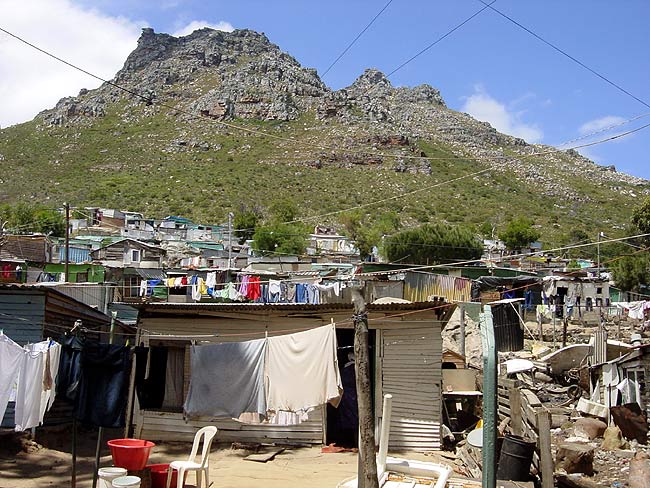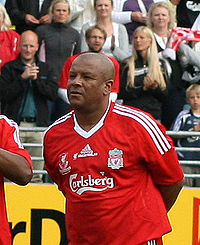Football is a sport that the majority of people in South Africa are passionate about but, there are real questions as to whether there will be a legacy for them post the 2010 World Cup.
The sport’s main support base is black African. Attend any Premier Soccer League (PSL) match and you will struggle to see white faces in the sea of black African supporters. Football has its roots in Africa in the former townships where it is the main recreational pass time for many.
Cheryl Roberts, a sports activist and commentator, asked the question in the Cape Argus newspaper if South Africa’s hosting of the 2010 FIFA World Cup would further develop football or create opportunities for business opportunists.
She noted that there whilst there will be legacy, through the building of stadia and improved transportation links, the games will mainly benefit business, business that has little interest in creating a legacy for grassroots football in South Africa.
Cheryl said: ”You can be sure that as soon as the World Cup ends, the very people who have benefited most won’t have any lingering associations with South African football, and they most certainly won’t be seen at football matches. It will be the same die-hard, passionate football lovers drawn from working class areas and disadvantaged townships, who will be there for football.”
For the majority of white South African’s the national sport is rugby with cricket a close second. In the area that I live in, a local business man and raconteur, Tom Purcell, held a talk titled “FIFA World Cup 2010 – like it or loathe it – you can’t ignore it!” His aim was to raise awareness of the economic and social benefits that the event could bring to South Africa to an audience drawn from the white business community.
This talk took place in the picturesque seaside suburb of Hout Bay in Cape Town, a short drive along the Atlantic coast from the magnificent new Cape Town Stadium at Green Point that will host FIFA World Cup matches in the city.
Hout Bay is like a microcosm of South Africa, with a wealthy, mainly white community, living alongside the black community of Imizamo Yethu, and so called ‘coloured’ community in the township of Hangklip near the harbour.

Imizamo Yethu has an estimated population of some 30,000 residents, who are mainly Xhosa speaking. The informal settlement was established in the early 1990s when 450 families who had been squatting in shacks around Hout Bay were moved to this new area from the side of a mountain overlooking the harbour. The population of the township has mushroomed since then, as black people in search of work, education and a better future settled there.
Conditions in this shanty town are shocking and have been made worse this winter due to prolonged rains that has seen much of the infrastructure in the township washed away. The majority of the residents lived in small corrugated iron shacks measuring about 9ft x 9ft. Few have running water in their homes and most are forced to share outside sanitation facilities.
As in most informal settlements football is their passion. Imizamo Yethu boasts a number of local teams and their football field is in use every evening and every weekend. In fact it is in use so much that it is in a terrible state, a dust bowl in the summer, a mud bath in the winter.
It is hard to see how the 2010 FIFA World Cup will impact on Imizamo Yethu or leave any lasting legacy. The local inhabitants will not be able to afford to attend a match but, thanks to the foresight of the local city council, they will have their own fan zone complete with a big screen. I don’t expect to see too many of the other inhabitants of Hout Bay attend though.
These passionate fans of the game deserve better than to have to play on a dirt football pitch and the opportunity has arisen to improve their sports facilities. The pitch they currently play on is on land which has been purchased to build a new private International School. As part of the arrangements to purchase this land the City Council has acquired land opposite the main entrance to Imizamo Yethu and intends to develop new sports facilities, including two or three new football pitches.
The bad news is that with other more pressing social demands, the City Council can only afford to build grass pitches. The combination of environmental conditions and the amount of usage these pitches will get guarantees that within a matter of months the new grass pitches will revert to dirt fields. The solution is a synthetic grass playing surface but this is beyond the City’s budgets.
In partnership with the UK based charity, International Development through Sport (IDS), we have launched a fund raising project in attempt to realise a real legacy from the 2010 World Cup for the passionate football playing community of Imizamo Yethu.
The aim is to attract 1,000 individuals from the UK to raise a relatively small amount of £300 and generate £300,000 to provide a synthetic surface. We want to ensure that all funds raised go towards the project and are used for the purpose they were intended. It is also important to us that the new facility is properly managed and is supported by the local community.
We are grateful to IDS, a charity operated by UK Sport, for agreeing to receive all funds and then to transfer them to the City of Cape Town under a contractual agreement where they will agree to lay the surface and put in place maintenance and management structures to support the new pitch. Hout Bay Sports and Recreation Council who represent the interests of the local community are also working with us on the project ensuring community consultation and support for the project.
 Someone who understands the passion of local football players and the challenges they face is Howard Gayle, the first black player to represent Liverpool. Howard travelled to Hout Bay last year with the Liverpool FC Community Coaching Team and worked with some of the young players from Imizamo Yethu. He experienced at first hand the state of the existing soccer field and understands better than most the need for a synthetic pitch.
Someone who understands the passion of local football players and the challenges they face is Howard Gayle, the first black player to represent Liverpool. Howard travelled to Hout Bay last year with the Liverpool FC Community Coaching Team and worked with some of the young players from Imizamo Yethu. He experienced at first hand the state of the existing soccer field and understands better than most the need for a synthetic pitch.
Howard was born in Toxteth in Liverpool and was at Liverpool for six years but was only given a total of five first team matches, later playing for several clubs including Birmingham City, Sunderland and Blackburn Rovers.
His finest hour for Liverpool came in the 1981 European Cup semi-final second leg away at Bayern Munich and he was rewarded with a winner’s medal at the end of that season, as a non-playing substitute in the final.
Earlier in his career he had helped England win the 1984 UEFA European under-21 Football Championships in which he scored a goal in the final against Spain. Howard has pledged his support for the project and will be making a donation to the fund.
Hopefully, with the support of Howard and another 999 individuals, we can ensure that there will be a legacy from the 2010 World Cup for at least one of the communities that Cheryl Roberts referred to.
You can find out more about the Imizamo Yethu Sports Field Project and contact us by visiting our website here.
If you would like to make a donation to the project you can use our Just Giving page here.
Norman Brook is the former chief executive of the British Triathlon Federation who now lives in South Africa, where he is the managing director of Brook Sport & Leisure
